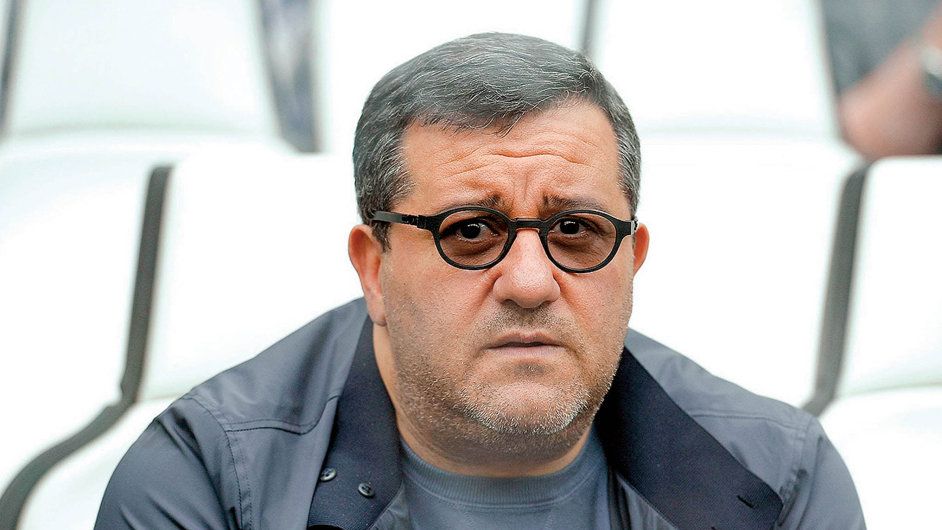Behind the Scenes: The Power and Influence of Football Agents
In the fast-paced and competitive world of football, there exists a group of individuals who hold significant power and influence behind the scenes: football agents. #football #footballagents

I. Introduction
In the fast-paced and competitive world of football, there exists a group of individuals who hold significant power and influence behind the scenes: football agents. These individuals play a crucial role in managing the careers of professional football players and navigating the intricate web of negotiations, contracts, and transfers. This article sheds light on the often enigmatic world of football agents, exploring their role and the immense power and influence they wield within the industry.
From securing lucrative contracts and transfer deals to shaping the image and brand of their clients, football agents have become pivotal figures in modern football. They possess the knowledge, connections, and negotiation skills necessary to navigate the complex landscape of player contracts and club negotiations. By understanding the dynamics of the agent-player relationship and their interactions with clubs, we can gain insight into the inner workings of the football industry and the behind-the-scenes power dynamics that shape the game we love.
II. The Rise of Football Agents
The rise of football agents can be traced back to the evolution of the football industry itself. In the early days of the sport, players often negotiated their contracts and transfers independently, with minimal representation. However, as the commercialization of football gained momentum, the need for professional intermediaries became apparent. The emergence of football agents can be attributed to several factors. Firstly, the increasing financial stakes involved in the game meant that players needed expert guidance to secure favorable contracts and maximize their earning potential. Agents stepped in to provide the necessary knowledge and negotiation skills to navigate the complex world of football contracts.
Secondly, the globalization of the sport opened up new opportunities and challenges for players. Transfers between clubs from different countries became more common, requiring agents to facilitate negotiations and bridge cultural and language barriers. Agents played a crucial role in connecting players with clubs and ensuring that their interests were represented during transfer dealings. Over time, the role of football agents has evolved from being mere intermediaries to becoming key decision-makers in player careers. Agents now have a profound impact on various aspects of a player's life, from contract negotiations and transfers to brand endorsements and media opportunities. They work closely with players to shape their career paths, advising them on the best opportunities and helping them navigate challenges.
The rise of super-agents, who represent multiple high-profile players, has further solidified the influence of football agents in the industry. These agents command significant bargaining power, leveraging their extensive networks and client base to secure favorable deals for their players. However, the increasing power and influence of football agents have also sparked debates and concerns. Critics argue that agents' interests may sometimes overshadow the players', leading to inflated contract demands and disruptive transfer negotiations. Nonetheless, the rise of football agents remains an integral part of the football ecosystem, playing a crucial role in shaping the careers and financial success of players in the modern game.
III. The Agent-Player Relationship
The agent-player relationship is a critical aspect of a footballer's career. Football agents serve as representatives, advisors, and confidants, playing a pivotal role in guiding and shaping their clients' professional paths. One of the key responsibilities of football agents is to build a foundation of trust with their players. Trust is essential as it forms the basis of a successful working relationship. Players rely on their agents to act in their best interests, making important decisions on their behalf. Agents must demonstrate integrity, transparency, and loyalty, ensuring that their actions align with the players' goals and aspirations.
Effective communication is another vital component of the agent-player relationship. Agents must maintain open lines of communication, providing timely updates, advice, and guidance. They act as a bridge between the player and the football club or potential suitors, relaying information, negotiating contracts, and facilitating transfers. Clear and effective communication allows players to make informed decisions and feel supported throughout their careers.
Beyond the contractual and financial aspects, football agents also have a responsibility to provide career guidance. They help players identify suitable opportunities for growth and development, considering factors such as playing time, league competitiveness, and club stability. Agents offer insights into different footballing environments and help players weigh their options to make informed decisions that align with their long-term objectives.
Moreover, agents often assist players with off-field matters, such as managing endorsements, sponsorships, and public image. They help players navigate the complexities of brand partnerships and media engagements, ensuring that these opportunities align with the players' personal brand and values. Ultimately, the agent-player relationship is a partnership built on trust, communication, and shared goals. A strong bond between an agent and player can empower the player to focus on their on-field performance, knowing that their agent is working diligently behind the scenes to secure the best opportunities and support their overall career progression.
However, it is important to note that the agent-player relationship is not one-size-fits-all. Different players have different needs, aspirations, and preferences. Successful agents adapt their approach, tailoring their services to meet the specific requirements of each player they represent. This personalized approach ensures that the agent-player relationship remains strong and effective, fostering a supportive environment for players to thrive in their footballing careers.
IV. Financial Aspects and Commission Structures
The financial aspects of the football agent industry are an important consideration in understanding their power and influence. Agents typically earn their income through commission fees based on the contracts and transfers they negotiate for their clients. The commission structure varies among agents, but a common practice is to receive a percentage of the player's earnings. This can include a percentage of the player's salary, signing bonus, performance-related bonuses, and other income streams. The standard commission rate is typically around 5-10% of the player's earnings, although it can vary depending on the agent's reputation, the player's profile, and the complexity of the negotiations.
The financial arrangements between agents and players are subject to negotiation and can be influenced by various factors. Agents with a higher profile and a successful track record may command higher commission rates. Young and emerging players may negotiate lower rates to attract reputable agents who can guide their career development. The commission structure in football agent contracts has faced scrutiny and criticism due to the potential for excessive fees and conflicts of interest. High-profile transfers involving substantial sums of money have led to significant agent fees, sparking debates about the fairness and proportionality of these payments.
In recent years, there have been calls for reforms to the commission structure to ensure a more transparent and equitable system. Football governing bodies have implemented regulations to monitor and regulate agent fees, aiming to prevent excessive payments and enhance transparency in financial transactions. Furthermore, the influence of agents on player transfers and contract negotiations has raised concerns about potential conflicts of interest. Agents may be incentivized to secure the most lucrative deals for their clients to maximize their own earnings. This has led to discussions about the need for increased regulations and oversight to protect the interests of players and maintain the integrity of the transfer market.
V. Regulations and Ethics
The role of football agents is governed by various regulations and ethical considerations to ensure fair representation and protect the interests of players. Governing bodies such as FIFA and national football associations have established regulations and licensing requirements for football agents. These regulations aim to maintain integrity, transparency, and accountability in the industry. Agents are often required to obtain a license and adhere to a code of conduct that outlines their ethical responsibilities.
The regulations typically cover aspects such as agent registration, financial transparency, conflicts of interest, and the handling of player funds. They aim to prevent unscrupulous practices, such as unauthorized representation, undue influence, or exploitation of players. Ethical concerns in the football agent industry revolve around issues such as conflicts of interest, excessive fees, and fair representation. Agents are expected to act in the best interests of their clients, providing them with professional advice and guidance. They should prioritize the long-term career development and well-being of the players they represent.
Thrilled to share that Wasserman won “Best Sports Communications Strategy” at last night's @HashtagSports awards for the successful effort to bring Brittney Griner home. #WeAreBG was a collective effort led by more than 100 #TeamWass employees from across the company.
— Wasserman (@Wasserman) June 15, 2023
Congrats… pic.twitter.com/AazxCSL7Ns
Fair representation requires agents to negotiate contracts and transfers that align with the player's objectives and market value. They should avoid conflicts of interest that could compromise their ability to act in the player's best interests, such as representing multiple parties in a single negotiation. Ethical considerations also extend to the financial aspects of the agent-player relationship. Agents are expected to provide transparent financial management, ensuring that player funds are handled responsibly and in accordance with applicable regulations.
To maintain ethical standards, governing bodies and football associations regularly monitor and enforce the regulations governing agents. Violations of these regulations can result in disciplinary actions, including fines, suspensions, or revocation of licenses. However, challenges remain in effectively enforcing regulations and addressing ethical concerns in the football agent industry. Continued efforts by governing bodies, clubs, and players' unions are necessary to promote fair representation, transparency, and accountability in agent-player relationships.
If you would like to become a licensed football agent, you can find more informations about the process here.
VI. Most famous football agents
Jorge Mendes: Known as one of the most powerful agents in football, Jorge Mendes has an extensive client list that includes Cristiano Ronaldo, Jose Mourinho, and James Rodriguez. His ability to secure high-profile transfers and negotiate lucrative contracts has earned him a reputation as a top agent.
Mino Raiola: Raiola represents some of the most recognizable names in football, including Paul Pogba, Zlatan Ibrahimovic, and Erling Haaland. He is known for his tough negotiating tactics and ability to secure substantial transfer deals for his clients.
Jonathan Barnett: Barnett is the founder of Stellar Group, a prominent football agency. He represents Gareth Bale, Luke Shaw, and Jack Grealish, among others. Barnett is known for his shrewd business acumen and has been involved in some record-breaking transfer deals.
Pini Zahavi: Zahavi has been involved in numerous high-profile transfers throughout his career, including the transfers of Rio Ferdinand, Arjen Robben, and Neymar. He has established strong relationships with club owners and has played a significant role in facilitating major deals.
Giuliano Bertolucci: Bertolucci has represented several Brazilian football stars, including Ronaldinho, Kaka, and Philippe Coutinho. He is known for his extensive network in South America and has been instrumental in facilitating transfers between Brazilian players and top European clubs.
These agents have not only been instrumental in negotiating contracts and transfers but have also played a vital role in providing guidance and support to their clients throughout their careers. Their expertise, connections, and negotiation skills have allowed them to shape the football landscape and leave a lasting impact on the industry.
VII. Most famous agencies representing football players
Stellar Group: Stellar Group is one of the most prominent sports management agencies, representing a wide range of football players around the world. They have a strong presence in Europe and manage the careers of top players such as Gareth Bale and Jack Grealish.
Wasserman: Wasserman is a global sports agency that represents a significant number of football players, including some of the biggest names in the sport. Their client list includes players like James Rodriguez, Christian Pulisic, and Alex Oxlade-Chamberlain.
Gestifute: Jorge Mendes and his agency, Gestifute, have a strong presence in European football. Representing players like Cristiano Ronaldo, Bruno Fernandes, and João Félix, Mendes has established himself as a significant figure in the player representation field.
Creative Artists Agency (CAA): CAA is a global talent agency that has expanded its presence into football representation. They represent players like Romelu Lukaku, Joshua Kimmich, and Hakim Ziyech.
Stellar Football Ltd: Stellar Football Ltd, led by Jonathan Barnett, is another prominent agency representing football players. Their clients include Gareth Bale, Luke Shaw, and Kieran Trippier.
Base Soccer Agency: Base Soccer Agency is a leading player representation agency, with clients such as Raheem Sterling, Riyad Mahrez, and Harry Maguire.
These are just a few examples of the many renowned agencies representing football players. Each agency has its own strengths and specialties, and their client lists often include some of the most talented and sought-after players in the world.
VIII. Conclusion
In conclusion, football agents wield significant power and influence in the world of football. They have evolved from mere intermediaries to key decision-makers, guiding players through their careers and negotiating crucial deals. However, this power does not come without controversies and challenges. High-profile controversies have raised concerns about unauthorized approaches, conflict of interest, and transfer irregularities. Agents also face challenges in establishing their reputation, competing for clients, negotiating complex contracts and transfers, and navigating evolving regulations. Despite these challenges, football agents remain essential figures in the industry, playing a vital role in shaping the careers of players and facilitating the functioning of the football ecosystem. As the industry continues to evolve, it is crucial for agents to maintain ethical standards, adhere to regulations, and prioritize the best interests of their clients, ensuring a fair and transparent representation in the ever-competitive world of football.

